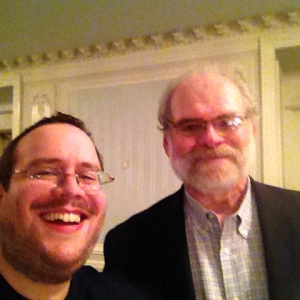Here Comes Everyone – a Day of Inspiration and Advocacy at the Network for Public Education Conferance

Let me ask you a hypothetical question:
If you could have dinner with any five people in the world, who would they be?
You don’t have to ask me that question. I not only had dinner with them, I spent the whole freaking day with them at the Network for Public Education Conference!
And there were more like 500 of those folks!
Imagine everyone you’ve ever read about in the resistance to corporate education reform.
Imagine them all in one place, standing in line all around you waiting to select a Danish.
Yeah. That was breakfast.
I invited the amazing Pennsylvania blogger Russ Walsh to my table to chat over bagels and coffee.
I told him that I’d been so inspired by his criticism of the Dibels test that I refused to allow my own daughter to take it. He laughed and said it was a mighty responsibility.
We hung out. No big deal.

And then I saw Peter Greene of the Curmudgucation blog. We sat together during a break out session and talked shop. He told me how it was frustrating sometimes to feed the beast – to keep writing articles after one of yours had made an impression. I laughed because I knew exactly what he was talking about.
We’re best friends now.

I was walking down a hallway and there was Diane Ravich right behind me.
Yes! Right. Behind. Me.
I tried to collect myself before walking up to her.
Don’t blow this, Singer! I warned myself, but I kinda’ did anyway.
I introduced myself and shook her hand. She knew exactly who I was and said, “I love your blog.”
SIGH.
She loves my blog.
But then I opened my mouth to respond, and all that came out were unrelated syllables. Something like, “blllurgghh.”
But there were more people waiting to talk to her. She probably didn’t notice. Right?

And really I could go on like this for days.
However, it wasn’t just the opportunity to meet and talk with education heroes. The breakout sessions were amazing:
The Opening Symposium
Brother Jitu Brown of NPE and Tanasia Brown from the Newark Student Union were inspiration personified. Though she’s only a student, Danasia lead the assembly like a seasoned preacher on Sunday. And Jitu’s words just made you want to rush out of those doors and renew the fight.

Debunking Myths:
It may not be the zombie apocalypse yet, but some decaying half-dead arguments continue to shamble across the scene. They’ve been disproven repeatedly but some people refused to accept it.
Media Matters Hilary Tone and People for the American Way’s Diallo Brooks gave some excellent tips for putting these zombie arguments to rest:
Six Tips For Debunking Myths
1) Familiarize facts – minimize falsity. Start with the truth, not what’s wrong.
2) People believe what they hear. Warn them about it. “You’ll probably hear the Koch Bros. say…”
3) Don’t just debunk – retell. After dispelling a lie, make sure to give a new narrative to replace it.
4) Use graphics. People love visuals.
5) Make things easy to understand. Don’t use jargon. Expect no prior knowledge.
6) Messengers matter. Credible and unexpected sources can be very convincing. When someone you’d expect to disagree with you actually agrees, it makes people think, “Even THIS guy gets it.”
Other tidbits include:
-Call out false progressives. If they don’t understand the real problems, they can’t come up with real solutions.
-The media only talks about education policy with actual education experts 9% of the time.
America’s Suicidal Quest for Educational Excellence:

Author Yong Zhao brought down the house with an amazing and hilarious presentation. He argued that America’s corporate educational reform movement is destroying the very things about our education system that makes it great.
The goal of increased standardized test scores is ill conceived. Countries with high test scores produce graduates who are less creative and interested in education. Why is this something we want to emulate?
Other tidbits:
-Standardization isn’t a reform. China’s been doing it since 600 AD.
-Our schools aren’t getting worse on standardized tests. They’ve always been bad at them. But that’s not necessarily a bad thing.
-We’re working to weed out and select kids. If children do what some few people want, they’re gifted. If not, they’re special ed. But does that mean our requirements are any good?
-Societies aren’t murdered. They commit suicide. Focusing on standardization instead of creativity and difference, is suicide. We’re destroying our most cherished virtues.
-One of the amazing things about US education is we accept everyone for 12 years. This doesn’t happen everywhere in the world.
-If you spend 10,000 hours working at something you’re already good at, you’ll become great. If you force kids to spend that amount of time on something they don’t like, they’ll only become mediocre.
-WARNING: Common Core may increase standardized test scores but it will make your child hate reading for life.
-We do not instill creativity in our students better than Asian systems. We just kill it less successfully.
-Standardization is preparing kids for jobs being replaced by machines and outsourced. We should not compete with China. We should create new opportunities.
-Do not fit your kids in to the future. Let them create it.

And so much more!
This has easily been one of the best days of my life. Top 10 for sure.
And there’s still a half day to look forward to tomorrow.
So many burning questions:
-Which education luminary will I eat breakfast with in the morning?
-Will my BFFs Walsh and Greene sign my program book?
-Will I get a chance to express a meaningful sentence to Diane?
Find out in our next exciting episode!

Good use of pictures. The more the better
ReplyDeleteActually, standardization didn't start in China in 600 AD. It started more than 2,000 years before that, and how the Han Dynasty would revise and use standardization had the same goals of the corporate education reform movement today.
ReplyDelete2200 B.C. Chinese emperors (kings would be more accurate) used large-scale "aptitude" testing for the selection of civil servants (Machek, 2004).
Emperor Wu of Han (141 - 87 BC) started an early form of the imperial examinations, in which local officials would select candidates to take part in an examination of the Confucian classics, from which he would select officials to serve by his side.
In fact, when Emperor Wu of the Han Dynasty adopted and revised Confucian teaching to be the state ideology, it was done to standardize how the people thought and behaved so they could be easily controlled.
"The background to Emperor Wu’s act concerned his own ambitions and the brilliant
political strategy of a Confucian scholar named Dong Zhongshu (c. 179-104 B.C.), historically
perhaps the most influential Confucian after Confucius himself. Dong reformulated
Confucianism by systematically adapting to it popular ideas about the structure of the universe
and man’s relation to Nature and by carefully tailoring these ideas to exalt the role of the
emperor in the structure of the Qin-Han state. Using this revised, emperor-centered version of
Confucianism, Dong successfully proposed to Emperor Wu an adoption of Confucianism as state
orthodoxy that perfectly fit the emperor’s own, decidedly non-Confucian, ambitions."
http://www.indiana.edu/~e232/09-Han.pdf